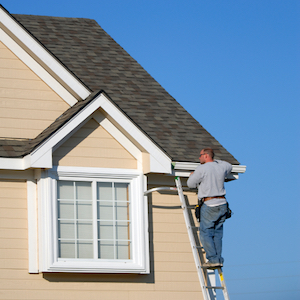5 Home Improvements That Are Tax Deductible
 It’s a question that many industrious homeowners ask; are home improvements tax deductible? With tax season approaching, considering the right deductions can significantly lower your tax bill. While not all home improvements are tax deductible–particularly those that are only for comfort or entertainment, like a game room or a new refrigerator–some are.
It’s a question that many industrious homeowners ask; are home improvements tax deductible? With tax season approaching, considering the right deductions can significantly lower your tax bill. While not all home improvements are tax deductible–particularly those that are only for comfort or entertainment, like a game room or a new refrigerator–some are.
Note: The Tax Cuts and Jobs Act will change itemized and standard deductions for the 2018 tax year, but these changes generally will not affect itemized deductions on returns for 2017.
Take Advantage of These 5 Tax Deductible Home Improvements
Loan Interest Deductions
You may be aware that the interest you pay on your home mortgage loan is tax deductible. However, you may not know that this also applies to any loan that is secured by your home, including a loan you take out to make significant home renovations. Though the cost of the renovations aren’t tax deductible (unless they fall into a different category below), deducting the interest from the loan can help to offset some of the costs.
Energy Efficient Improvements
When it comes to replacing windows, doors, roofing, insulation, or water heaters, energy efficiency is the way to go. Portions of energy efficient home improvements are tax deductible using the Nonbusiness Energy Property Credit. You’ll need to use qualified energy efficient materials, but these home upgrades can also help to reduce your heating or cooling bill. This may be especially important if you purchased a fixer-upper.
The IRS includes the following under this credit:
- Insulation
- Energy-efficient exterior windows and doors
- Some roofs
- High-efficiency heating and air-conditioning systems
- High-efficiency water heaters
- Biomass fuel stoves
- Alternative Energy Systems
If you want to further offset your energy bill and claim a tax deduction, the Residential Energy Efficiency Property Credit provides tax deductions for solar or wind power systems. Keep careful documentation of materials and costs so you can show records of these improvements if needed.
Donations After Home Update
If you updated your home and there was nothing wrong with your original appliances, furniture, or other big-ticket items, you can reduce the costs of your home upgrades by donating the original items. Organizations like Goodwill or Salvation Army will give you proof of your donations upon request, which you can include with your tax return and take the donations deduction. Remember that donated items should be in good condition, and that any items valued over $500 will need an appraisal. Make sure the donation site accepts big items before you bring them.
If the items are in good condition, you might donate your original:
- Sofa or recliners
- Kitchen chairs or table
- End tables
- Lamps
- Kitchen appliances
- Bathroom mirror
- Area rugs
- TV
- Speakers
Dual-Purpose Home Improvements
Several deductions are available for home improvements that serve a purpose beyond comfort or good-looks. If you made improvements to your home to accommodate a medical condition–for example, installing a wheelchair ramp or handrails–a portion of these expenses may be tax deductible. If you own a business and you renovated a space into an office or a space to work with clients, you can deduct these expenses. If you own a rental property or you rent out part of your home, certain repairs or improvements are tax deductible.
To take advantage of these home improvements that are tax deductible, you’ll need to itemize your return. These deductions may also be limited by your income, or by a percentage of total expenses. Keep in mind that this is a starting point, and only a tax professional can tell you which deductions you qualify for.


